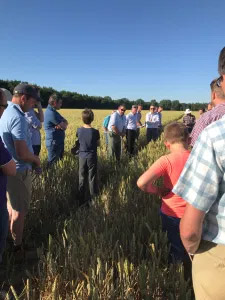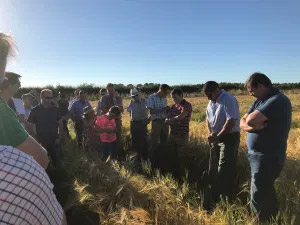Farm Walk Hosted by Angus Gowthorpe
Posted July, 30th, 2018
Angus Gowthorpe – BASE-UK Member, who was recently awarded second place in the Soil Farmer of the Year 2018 competition held by the Farm Carbon Cutting Toolkit held a farm walk on the 3rd July 2018 at Approach Farm which organised by Becky Wilson of Farm Carbon Cutting Toolkit (FCCT). The walk was also open to BASE-UK members and several attended. Angus said:

“There was a good mixture of people in the group that came to the farm walk, from experienced long-term Conservation Agriculture practitioners to those who are thinking of making a start and those in between.
After a brief introduction to the farm we looked at a field of Relay/JB Diago/Skyfall mixed wheat which was following spring linseed after a sheep grazed cover crop. This resulted in some discussion about the reasons of growing mixed variety crops, what went in the cover crop mix and the benefits of grazing cover crops.
We also discussed BYDV as this field had aphids in it in late autumn and contrary to my agronomist’s advice I decided not to spray it, relying instead on the beneficials to combat the aphids. Unfortunately, this was the wrong decision, for the crop anyway, as it was subsequently mildly infected with BYDV. My agronomist, Philip Vickers, also spoke briefly about our pesticide policy, products and rates used on our farm under a no-till & conservation agriculture system in comparison to farms that he looks after which follow conventional crop establishment.
Following this we looked at a field of winter barley, following winter wheat, which was a blend of Surge and Infinity and had a disappointing area of meadow brome in it. The reasons for this were discussed as well as the drainage, mole ploughing, the possible use of gypsum and the rotation on the farm. Also discussed was my experience growing winter barley after winter wheat and the potential problem of volunteers in the winter barley. A very low level of volunteers were present in the crop but not enough to affect saleability in anyway. We then looked at a second field of winter barley which was a far better example of the crop and no-till. It didn’t have any meadow brome in it! This second field was a medium soil whereas the first was a heavy clay.
After this some people joined me in looking at a field of Vertigo spring beans on heavy land in a field away from the farm. This field had been flooded to approximately 6 feet in the Boxing Day 2015 floods and was under water for about 3 weeks. Once the field had dried out I drilled a summer cover crop in it, followed by winter wheat then another cover crop before the spring beans.
After the walk, much discussion was had about the benefits of conservation agriculture and the changes we are seeing in our soils as well as our crops whilst enjoying a lovely tea provided by Becky Wilson. There was also much discussion, inevitably some would say, about drills and my John Deere 750A created quite a bit of conversation about how it copes with different soils and in different situations and also the benefits of the added liquid fertiliser system. Other topics that came up in conversation were slugs, straw raking, varieties suited to direct drilling, seed rates, drilling dates, rotations, particular weeds that can be a problem in no till, direct drilled crops hanging on longer in the drought, organic manures and composts and worms as well as a whole host of other topics.”
Our thanks to Angus for hosting this event and congratulations on his achievement.
If any BASE-UK member would like to hold a farm walk and needs help promoting it, please email Rebecca rebecca@base-uk.co.uk who will arrange to let members know. Autumn farm walks would be of interest to members if anyone is able.
Recent Posts
BASE-UK - ANNUAL CONFERENCE 2024 - SIX INCHES OF SOIL PREVIEW
BASE-UK - ANNUAL CONFERENCE 2024 DAY 2 - HANNAH FRASER
BASE-UK - ANNUAL CONFERENCE 2024 DAY 2 - RICHARD JENNER
BASE-UK - ANNUAL CONFERENCE 2024 DAY 2 - DAVID GOODWIN
BASE-UK - ANNUAL CONFERENCE - DAY 2 - JAY FUHRER PART 2
BASE-UK - ANNUAL CONFERENCE DAY 2 - JAY FUHRER PART 1
BASE-UK - ANNUAL CONFERENCE DAY 1 - SPEAKER PANEL
BASE-UK - ANNUAL CONFERENCE DAY 1 - BEN ADAMS
BASE-UK - ANNUAL CONFERENCE DAY 1 - TOBY SIMPSON
BASE-UK - ANNUAL CONFERENCE DAY 1 - ALEX FRASER
